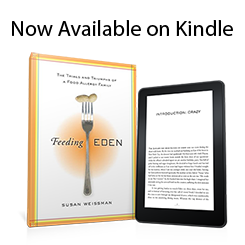Food Allergies: Bullying…Teasing…Let’s Call The Whole Thing Off
I've spent the winter holidays enjoying my family and, in effect, muted by the recent surge of media surrounding the topic of "bullying" in regards, to food allergies. In case you missed this information stream (and if you are reading this post than it's very unlikely) here is one of so many - a Time article on CNN.com discussing recent research conducted by Mount Sinai Medical Center:
It's not easy to read about bullying. Not because my food allergic son Eden has been subject to the kind of overt aggression described in the study. But because he has experienced more subtle yet increasingly disarming behaviors that amount to nothing more or less than hurtful teasing. What's the difference? I looked at Merriam Webster...
Bully verb (transitive) 1 : to treat abusively 2: to affect by means of force or coercion / verb (intransitive verb) 1: to use browbeating language or behavior
Tease verb (transitive) a : to disturb or annoy by persistent irritating or provoking especially in a petty or mischievous way b : to annoy with petty persistent requests : to obtain by repeated coaxing c : to persuade to acquiesce especially by persistent small efforts d : to manipulate or influence as if by teasing e : to make fun of
What does food allergy teasing sound like? It sounds like one boy shouting above all the rest at a crowded lunch table Hey guys, Eden has never tried ice-cream. Ever! It sounds like a child waving a doughnut around and whispering across his desk at my son I'm practically torturing you with this aren't I? This as he licks his lips and Eden looks down at his his "safe treat." It sounds like some other remarks Eden and I have heard that aren't worthy of repeating in this post.
Bullying is awful. It's dangerous and insufferable. Teasing is ... something else. Teasing undermines. It embarrasses. Teasing is a baby step towards discrimination; a claw sharpening of sorts. It's my guess as a parent that more food allergic children are teased than bullied. Either way, as the lead researcher, Dr. Eyal Shemesh, of the seminal bullying study points out: "... these kids have a vulnerability that can be exploited. If someone wants to threaten them, they know how." Either way, it's now clear that those who love and protect children with food allergies have a duty to help them understand how to manage these discriminatory acts just as they teach them to manage their medical condition.

 What I Do Now:
What I Do Now: